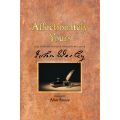Description
Meditations for every day of the year from the letters of John Wesley, compiled by Alice Russie.
For half a century John Wesley advised the Methodists on such matters as marriage, health, spiritual formation, education, employment, and finances. Thus, the Methodists were instructed, encouraged, and directed by timeless wisdom, rooted in God's Word and good comment sense. May Wesley's words of faith and love excite each reader's heart to year for, to ask, and to receive of God, that same faith and piety.
If Wesley’s journal and diary were his accountability, and his sermons were his theology, then his letters were his spiritual counsel and his prayers a benediction.
Mr. Wesley wrote to men and women who had embraced the gospel under his preaching as well as to people in official positions, both secular and ecclesiastical. As a general rule, he wrote in response to an inquiry dealing with a particular temptation or some other aspect of the pursuit of perfect love. Included in this volume are selections from letters that deal with the believer’s life in God and daily walk in the world.
Frank Baker wrote that Wesley’s letters express emotion more frequently and more fully than his other writings. “One characteristic which comes through in Wesley’s letters as nowhere else is his personal warmth. He loved people.” John probably wrote as many letters as Charles wrote hymns.
During the passage of time since these letters were written, the English language has experienced a multitude of changes, both in style of expression and, often, in the accepted meanings of words and expressions. However, Wesley held strong notions about the “use of Biblical language whenever possible;” so while “translating” for contemporary readability, minimal changes have been made in Mr. Wesley’s style, which is part of his lasting appeal.
For the same reason, his prayers—a portion of which concludes each day’s reading, chosen to reflect the type of prayerful response the recipient might have made—are distinctly Scriptural, often liturgical, in tone. No effort has been made to modify that tone—this, too, is characteristic Wesley.
Mr. Wesley loved his flock as a father loves his children, which in truth they were, “begotten in the Lord;” and it was a reciprocal affection. He lost no opportunity to stir them up to an increase in love to God and their neighbor, and to good works.
About John Wesley
John Wesley was born in 1703 into the already large family of a pious, but poor, rector of the Church of England. He was the fifteenth child, the second surviving son of Samuel and Susanna Wesley. As was the custom of that era, John’s early education was at his
mother’s knee; his mother became his first, and remained his primary, spiritual mentor. At age seventeen (in 1720), he departed for Christ Church, Oxford, as a scholarly, sociable young man. There he took his bachelor’s degree (1724), his master’s degree (1727), and was ordained priest in the Church of England (September 1728). Following this latter event, he claimed, “The world is my parish!” and suited action to the word, in a variety of ways, for the rest of his life.
Although he had developed a solemn seriousness about religion, he did not experience the new birth until his thirty-sixth year (1738). He testified that while he was listening to someone read from Martin Luther’s Preface to the book of Romans, he “felt his heart strangely warmed,” and knew that God had, for Christ’s sake, forgiven his sins.
And thus, “salvation by faith” became a dominant theme of his preaching. During his lifetime, he is said to have traveled over a quarter of a million miles, mostly on horseback, and is credited with preaching more than 44,000 sermons in addition to publishing extensively and maintaining a voluminous correspondence. After his death, he became known as the “Father of Methodism.”
On March 2, 1791, three months shy of his eighty-eighth birthday, he died in the company of some of his most cherished friends in the faith, murmuring, “Best of all, God is with us!”
Features
Reviews
No reviews found



